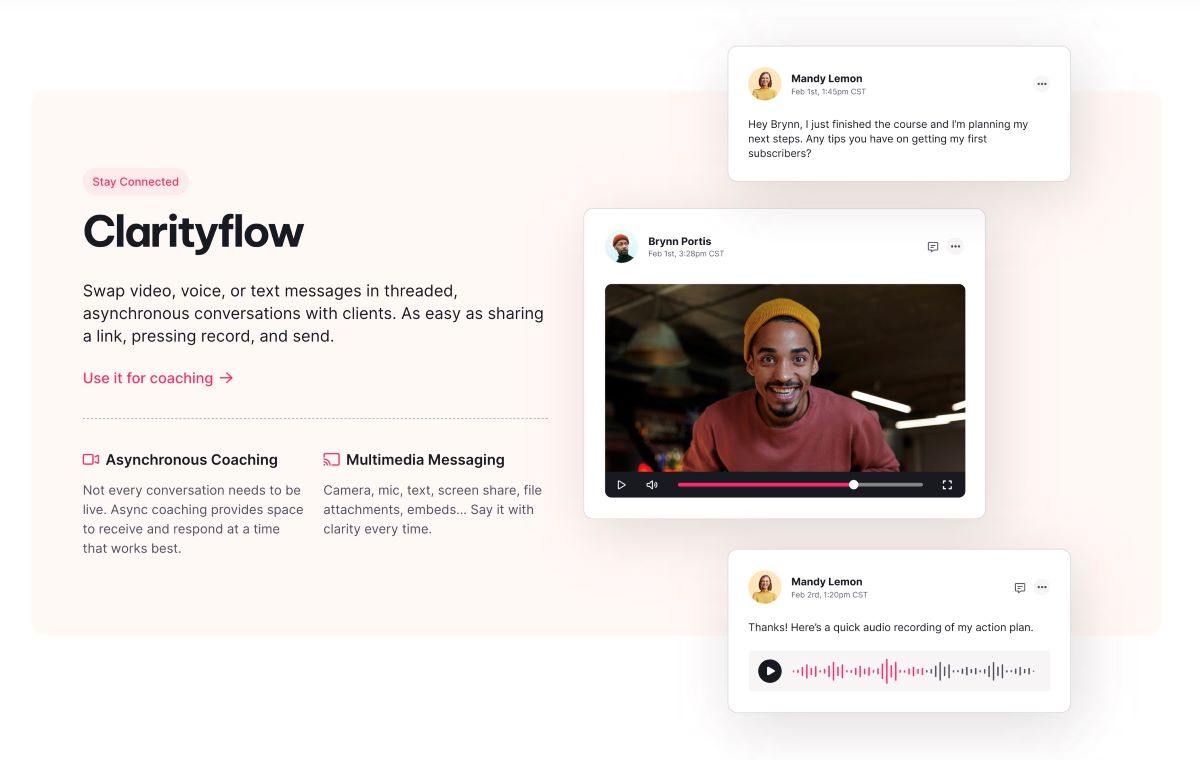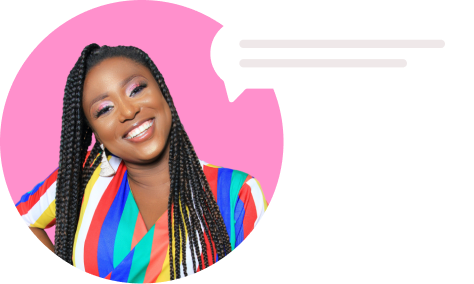60 Powerful Coaching Questions to Drive Client Transformation

As a coach, your role isn't to dictate, but to guide, helping clients unlock their full potential. But what's the secret to effective guidance?
Powerful, thought-provoking coaching questions.
Well-crafted coaching questions can reveal your clients' deepest desires and motivate them to take decisive action. They can illuminate the path from where they are to where they want to go.
In this guide, we will delve into the art of effective coaching questions to drive client transformation. Whether you're a seasoned coach or a beginner, this article will equip you with the tools to take your coaching to the next level.
Ready for a deep dive? Let's begin this transformative journey.
Here’s what we’ll cover in this article:
Understanding the Coaching Process
Get the lowdown on the ins and outs of coaching, and why it's such a game-changer for personal growth.Types of Coaching Questions
Discover the different types of coaching questions and when to use them to get your clients thinking.Questions for Goal Setting and Action Planning
Ready to get your clients moving? We'll go through some questions that help with setting clear goals and creating actionable plans.Questions for Encouraging Self-Awareness and Emotional Intelligence
Dive into how you can ask questions that increase self-awareness and emotional intelligence in your clients.Questions for Overcoming Limiting Beliefs and Mindsets
Break through barriers with our top questions for challenging limiting beliefs and fostering a growth mindset.Questions for Fostering Resilience and Maintaining Motivation
Keep the fire alive with these questions that inspire resilience and maintain motivation in your clients.Questions for Monitoring Progress and Adjusting Plans
Discover how to keep tabs on your client's progress and adapt plans as needed with these effective questions.The Art of Powerful Questioning
Master the art of asking potent questions that engage, inspire, and provoke thought in your clients.Enhancing Your Coaching Practice with Clarityflow
Find out how using Clarityflow's asynchronous communication platform can take your coaching to the next level.
Understanding the Coaching Process
Before diving into the specifics of coaching questions, it's crucial to grasp the essence of the coaching process.
While coaching can take many forms, it essentially involves a relationship between the coach and the client, where the coach facilitates a process of growth, learning, and change.
Coaching isn't just about giving advice or solving problems for your clients. Instead, it's about helping them discover their own solutions and navigate their unique journey.This is where it fundamentally differs from mentoring and consulting, where advice and guidance are often more directive.
In the coaching realm, you're not the expert on your client's life – they are. You're there to guide, not to lead; to listen more than you speak. Your role is to create a safe and supportive environment that encourages self-exploration, introspection, and personal growth.
Effective communication is at the heart of successful coaching, of which active listening is a cornerstone.
As a coach, your goal is to truly understand your clients' perspectives, feelings, and goals. Only by listening can you ask questions that really matter to your client and encourage them to delve deeper into their thoughts and emotions.
Now, let's get to the heart of our topic - coaching questions. These are the catalysts that can spark self-discovery and lead to powerful transformations. Ready to learn more?
Types of Coaching Questions
As you navigate the coaching journey with your clients, the type of questions you ask can significantly influence the outcome of your sessions.
Each type serves a different purpose and helps your clients explore their thoughts, feelings, and experiences from varying perspectives.
Let's take a look at five different types of coaching questions and when they can be most effective:
Open-ended Questions
These are the lifeblood of a coaching conversation.
Instead of inviting a simple yes or no response, open-ended questions encourage clients to share their thoughts and feelings more, giving you a deeper understanding of their perspectives.
Examples include:
"What does success look like to you?"
"What values are most important to you in life?"
"What is your biggest passion or driving force?"
Probing Questions
These questions dig deeper into a specific area, helping clients explore their thoughts and feelings on a deeper level and identify any underlying issues that might not be immediately apparent.
Examples include:
"What beliefs are holding you back?"
"How does this situation align with your core values?"
"What assumptions might you be making about this situation?"
Reflective Questions
Reflective questions are used to help clients review their experiences, learn from them, and gain new insights.
They encourage clients to think back and analyze their actions and decisions.
Examples include:
"If you encounter a similar situation in the future, how would you approach it?"
"What patterns are you noticing in your actions or decisions?"
"How did that experience impact your thoughts and feelings?"
Hypothetical Questions
These are future-oriented questions that help clients explore possibilities and prepare for different scenarios.
They stimulate creative thinking and can be especially helpful when clients feel stuck or unsure about what to do.
Examples include:
"What would you do if you knew you could not fail?"
"How would your life change if you achieved this goal?"
"What would you try if you knew no one would judge you?"
Scaling Questions
Scaling questions are a great tool to gauge a client's feelings, motivation levels, or confidence regarding a particular issue.
They provide a visual way of representing the client's current situation and desired outcomes.
Examples include:
"On a scale of 1-10, how confident are you that you can achieve this goal?"
"Where would you place your current satisfaction level with your work-life balance?"
"On a scale from 1 to 10, how committed are you to this course of action?"
Understanding these types of coaching questions and when to use them can significantly enhance your coaching conversations and facilitate your clients' journeys of self-discovery and transformation.
Next, let's delve into how you can utilize these question types to support your clients in setting and achieving their goals.
Questions for Goal Setting and Action Planning
The coaching process is only complete with a clear roadmap for the journey. In this context, goal setting and action planning form the basis of this roadmap, providing direction and structure for your client's transformation.
Goal setting involves identifying the objectives your clients want to achieve. Ensuring these goals are SMART (Specific, Measurable, Achievable, Relevant, and Time-bound) is essential. This way, they become more than just abstract wishes, but tangible targets that can be pursued systematically.
Once goals are set, it's time to turn them into action. Action planning involves breaking down the goals into manageable steps and establishing a clear plan for accomplishing them. It also requires identifying potential obstacles and creating strategies to overcome them.
As a coach, your role is to guide your clients through this process, encouraging them to take ownership of their goals and plans. Here's where powerful coaching questions come in.
Below are some examples:
Goal Setting Questions:
"What is your ultimate goal in this area of your life? Can you be more specific?"
"How will you measure your success in achieving this goal?"
"What makes this goal achievable for you?"
"Why is this goal relevant or important to you?"
"By when would you like to achieve this goal?"
Action Planning Questions:
"What are the specific steps you need to take to achieve this goal?"
"What resources do you need to make this happen?"
"What potential obstacles might you encounter, and how will you overcome them?"
"How will you hold yourself accountable for implementing this plan?"
"What will be your first step towards achieving this goal?"
Using these questions, you can assist your clients in setting robust, meaningful goals and creating detailed, actionable plans to achieve them.
Questions for Encouraging Self-Awareness and Emotional Intelligence
In any coaching relationship, fostering high self-awareness and emotional intelligence within your clients is pivotal. These two interconnected elements can dramatically amplify the effectiveness of the coaching process and the client's personal and professional growth.
Self-awareness refers to understanding one's thoughts, emotions, strengths, weaknesses, and behavioral patterns. It is about recognizing how these elements influence one's actions, interactions, and overall well-being.
On the other hand, emotional intelligence is the ability to understand, use, and manage one's emotions to relieve stress, communicate effectively, empathize with others, overcome challenges, and defuse conflict. It also involves recognizing others' emotions and understanding their perspectives.
Coaching questions play an instrumental role in nurturing these attributes within your clients.
Here are some examples:
Self-Awareness Questions:
"What strengths do you bring to this situation?"
"What are some areas you feel you need to improve upon?"
"What triggers cause you to react in ways you later regret?"
"How does your personal history shape your reactions and behaviors?"
"What patterns are you noticing in your emotional responses to different situations?"
Emotional Intelligence Questions:
"How do you manage your emotions when you're under stress?"
"What strategies do you use to maintain a positive mindset during challenges?"
"How do you typically respond to negative feedback or criticism?"
"How would you describe your ability to understand and empathize with others' perspectives?"
"What steps do you take to resolve conflicts in a healthy and productive manner?"
By promoting self-awareness and emotional intelligence, you're equipping your clients with the tools they need to navigate life's ups and downs, build healthier relationships, and achieve their most ambitious goals.
Questions for Overcoming Limiting Beliefs and Mindsets
On the path to self-improvement and goal achievement, one common roadblock many individuals face is limiting beliefs and mindsets.
These are deeply ingrained thoughts or attitudes that constrain us in some way. They may originate from past experiences, societal conditioning, or fear, and they can profoundly impact a person's life, shaping their behavior and decisions.
As a coach, one of your key roles is to help clients identify these limiting beliefs, challenge them, and ultimately replace them with empowering ones. This process requires creating a safe space where your clients can open up, reflect deeply, and confront these barriers.
Here are some powerful coaching questions you can use to facilitate this process:
"What beliefs do you hold that might be limiting your progress?"
"Can you recall when and how these beliefs first formed?"
"How have these beliefs influenced your decisions and actions?"
"What would be possible if these limiting beliefs weren't holding you back?"
"How can you reframe these beliefs to better serve your goals and aspirations?"
Overcoming limiting beliefs often involves significant emotional work and can be challenging for many clients. However, the transformation that emerges from this process can be truly life-changing, paving the way for personal growth, fulfillment, and success.
Questions for Fostering Resilience and Maintaining Motivation
The path toward personal growth and goal achievement can be challenging. It's often filled with setbacks, challenges, and occasional failures.
Here is where resilience — the ability to bounce back from adversity — and motivation — the drive to keep going — play significant roles.
As a coach, you can help your clients build resilience and maintain motivation through effective questioning. These questions can encourage your clients to view setbacks as learning opportunities, identify their sources of motivation, and keep their eyes on their goals even when times get tough.
Here are some examples:
Resilience Building Questions:
"How have you overcome challenges or setbacks in the past?"
"What did you learn from these experiences that can help you now?"
"How can you view this situation as an opportunity rather than a setback?"
"What resources (internal or external) can you tap into to help you bounce back?"
"How can this challenge make you stronger or wiser?"
Motivation Sustaining Questions:
"What drives you to pursue this goal?"
"How will achieving this goal align with your values or long-term vision?"
"What small steps can you take right now that would bring you closer to your goal?"
"How will you celebrate your progress and small wins along the way?"
"What will keep you motivated when you encounter obstacles?"
The journey toward transformation is as much about resilience and motivation as it is about setting goals and creating action plans. These elements together can provide a holistic approach to effective coaching.
Questions for Monitoring Progress and Adjusting Plans
The journey toward transformation is rarely linear. It's a process that involves trying, learning, adjusting, and trying again.
As a coach, it's your job to help your clients keep track of their progress, learn from their experiences, and make necessary adjustments to their action plans.
This process of continuous monitoring and adjustment keeps your clients moving forward and promotes a growth mindset. It instills in them the understanding that it's okay to change course if something isn't working and that each experience — whether successful or not — brings valuable lessons.
Here are some powerful coaching questions that can aid in this process:
Monitoring Progress Questions:
"What progress have you made towards your goal since our last session?"
"What successes or achievements would you like to share?"
"What metrics or indicators suggest you're moving in the right direction?"
"How are you tracking your progress and successes?"
"What changes have you noticed in your thoughts, feelings, or behaviors?"
Adjusting Plans Questions:
"What challenges or obstacles have you encountered, and how did you handle them?"
"What isn't working in your current plan, and why do you think that is?"
"Based on your experiences, what adjustments do you think you need to make?"
"What different approach could you try to overcome this hurdle?"
"What will be your first step in implementing these adjustments?"
By closely monitoring their progress and continually refining their plans, your clients can stay on track toward their goals and maximize their chances of success.
The Art of Powerful Questioning
Mastering the art of powerful questioning is a crucial skill for any coach. The questions you ask can profoundly impact your clients, helping them unlock insights, challenge their assumptions, and drive their growth.
Here are some tips and tricks for asking the right questions:
Open-Ended Questions: Open-ended questions are powerful tools in a coach's arsenal. They encourage expansive thinking and deeper reflection, allowing clients to explore their thoughts and feelings.
Be Curious and Genuine: Ask questions from a place of genuine curiosity, not to steer your clients towards a specific answer. This non-judgmental curiosity helps create a safe space for clients to open up and explore their thoughts and feelings.
Listen Actively: The best questions often stem from what your client has just said. By listening attentively, you can ask follow-up questions that delve deeper into the topic at hand.
Reflective Questions: These questions encourage clients to examine their thoughts, feelings, and actions. For example, "How did that make you feel?" or "What led you to that action?"
Empower Clients: Ask questions that empower your clients, highlighting their ability to find solutions and make decisions. For example, "What steps could you take to overcome this challenge?" or "How could you handle this situation differently in the future?"
Use Silence Effectively: Don't rush to fill silence after asking a question. Give your client time to reflect and articulate their thoughts. The most insightful responses often come after a pause.
Be Flexible: Be ready to adjust your line of questioning based on your client's responses. The coaching conversation should be fluid, adjusting to meet the client's needs in the moment.
Avoid Leading Questions: These are questions that suggest a particular answer. They can limit your client's thinking and impede their self-discovery process.
Remember, powerful questioning aims not to get answers but to provoke thought, stimulate self-discovery, and encourage self-directed learning in your clients.
It's about helping them uncover their own insights and solutions, empowering them to drive their growth and transformation.
Enhancing Your Coaching Practice with Clarityflow

In the world of coaching, creating space for reflection and introspection is crucial. It's often in these moments of quiet contemplation that clients experience breakthroughs and gain deep insights.
Clarityflow, an asynchronous communication platform for coaching, provides the perfect environment for thoughtful engagement. Here's how it can enhance your coaching practice:
Flexibility and Convenience:
Async communication doesn't require both parties to be present simultaneously.
This flexibility allows clients to engage when they feel most ready and receptive, whether that's early in the morning, during a lunch break, or late at night.Breathing Space:
Unlike real-time conversations, async communication provides a pause between the question and response.
This breathing space allows clients the time they need to reflect deeply on the coaching questions, engage in introspection, and formulate thoughtful responses.Thoughtful Engagement:
When clients have more time to contemplate and articulate their thoughts, their responses are often more insightful and comprehensive.
This deeper level of engagement can lead to greater self-awareness and personal growth.Documentation and Review:
Clarityflow's platform documents all exchanges, enabling clients to revisit previous conversations and track their progress.
Reviewing past discussions can reinforce learning and provide a valuable perspective on the client's growth journey.
Clarityflow's async communication offers a unique platform that supports the coaching process by fostering deeper reflection, offering greater convenience, and enhancing client engagement.
By leveraging this tool, you can take your coaching practice to new heights, providing an environment that truly facilitates client transformation.
Unlocking Transformation: The Power of Coaching Questions
Alright, so we've covered a lot of ground in this article, and hopefully, you've picked up some useful insights along the way.
One thing's for sure: coaching questions aren't just about getting answers. They're like keys that unlock deeper understanding, challenge limiting beliefs, and inspire change. They're the secret sauce in a coach's toolkit.
As you move forward in your coaching practice, remember that your questions have the potential to be a game-changer in your clients' journeys. So, go ahead, ask away, and watch as your clients navigate their way to their best selves.
Ready to level up your coaching game? Discover how the right platform can empower your clients and transform your coaching practice. Start your Clarityflow journey now.


